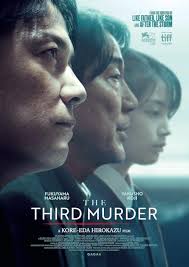
THE THIRD MURDER
Japan, 2017, 124 minutes, Colour.
Masaharu Fukuyama, Suzu Hirose.
Directed by Hirokazu Kore-eda.
Hirokazu Kore-eda has been a significant Japanese writer-director for more than 20 years. Many of his films previous to The Third Murder have been concerned with family, Nobody Knows, Like Father, Like Son, Our Little Sister, I Wish. This film is quite a change of pace.
Over several months, the director consulted with a number of lawyers, staging potential cases so that he could understand the workings of the court, the role of lawyers, especially defence lawyers, the nature of charges, the modification of charges, pleas for lesser penalties…
The film opens strikingly with the central character killing another. The audience has seen this scene.
However, the attacker has quite a back story, murder and robbery 30 years earlier, a jail sentence, now released, fired from his work at the factory, killing the owner. He appears throughout the film, generally composed, discussing the issues, but changing his motivation and implicating the wife of the owner, the revelation that the owner was abusing his daughter, the issue of stealing a wallet, sending the money to his estranged daughter…
The other central character is the young lawyer whose father, a prominent judge, has condemned the murderer 30 years earlier. The young lawyer wants to get to the truth but is caught up in the role of defence, the modification of charges, the attempts to identify the correct motivations. He goes to the countryside to talk with his father, to talk to the murderer’s wife who spurns him. He also has his personal story, a divorce, the little daughter, a sympathy towards the daughter of the murdered man.
Ultimately, there is a court case, with the murderer then denying that he killed the factory owner. The issue of the film seems to be looking at the characters involved in the crime and the issues, different perspectives, possible perspectives. Audiences may be thinking of Kurosawa’s Rashomon with the same events seen from quite different perspectives. The director was to use this theme for his 2023 film, Monster.
- The work of the director? Family films? Issues with different perspectives?
- The city of Yokohama, homes, buildings, legal offices, courts? The visit to the countryside, life in the village? The musical score?
- The prologue, the dark, Mishumi, the attack on the factory owner, his death, burning the body? The audience seeing the crime?
- The legal situation, Shigemori, status as a defence lawyer, the reputation of his father, his personal life, divorce, the scene with his daughter? The superior, handing over the case to the younger lawyers, a guilty verdict, death penalty? The discussions, the legal aspects?
- The impact of the film for the audience in judging the character of Mishumi, the role of the defence lawyers, listening the charges, formulating defence? Issues of truth?
- The story of Mishumi, the crime 30 years earlier, his jail sentence, security in jail, getting out, working at the factory, the clashes with the owner, his talking gambling, his being fired, dislike of the owner? Audience impression of him in the interviews with the lawyers? Changing his story, the lawyer believing him, the audience believing him or not?
- The possible motivations, resentment at being fired, stealing the owner’s wallet, the story of the wife hiring him to kill and the payment to him, the variation for the money and the fake labels and the success of the company, his sympathy for the daughter, her limp, the story of her being abused by her father? The lawyer imagining the scene with the two at the crime? Mishumi and his taunting the lawyers with the various possibilities?
- Shigemori, his continued interest, his being told to leave the case, his assistants, the interviews, with the victim’s wife and the issue of a relationship, her story about the fake labels, the interview with the daughter, the story of the abuse? His compassion? Is interview with Mishumi’s wife, her disdain, his daughter, the limp?
- Visiting his father and their discussion?
- The building up of the case, altering the charges? In the court, Mishumi and his denial, the impact on the proceedings of the case, the details of the court, the lawyers, the role of the judge? Is being found guilty?
- Shigemorie and his visit to Mishumi after the event, the discussions, what really happened, the different perspectives, the nature of truth?